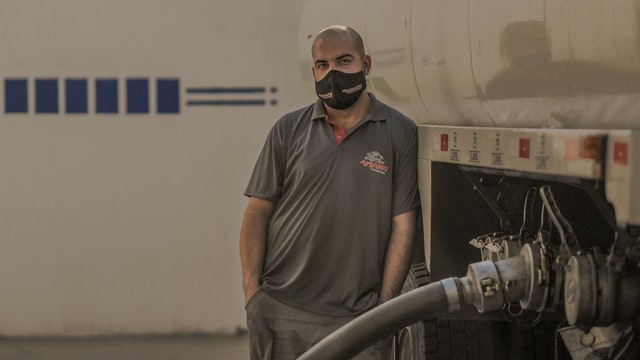Category:

- May 31, 2022
Eight Types of People You Need in Your Trucking Business to Make It Thrive
Carl Jung famously outlined his theory of archetypes nearly a century ago. It was the idea that all people embody certain universal characteristics, ever-present throughout reality and across time.
As you might expect, trucking businesses need different people in their organizations to thrive. Diversity is the key to success, but not in the way people usually think of it. Personal characteristics don’t matter a great deal. What really matters is the underlying archetype that the personality embodies.
Companies fail when they continually hire people with the same archetypes. Hiring managers unconsciously look for individuals with the same life essence as them, hiring them quickly while ignoring candidates with personalities that could move the business forwards considerably. It’s people who they would like to have a beer with, not those that are good for the company.
Trucking businesses are no different. They require people in their organizations to fulfill certain archetypal roles. If they fail to hire them, they will fall significantly behind.
So, who are these people you need to hire in your trucking business? Let’s take a look.
The Forward-Thinker
Trucking businesses require long-term planning for success. They need people who can take broader perspectives and think about what is coming down the pike.
Forward-thinkers, or innovators, are never convinced that a particular strategy is the best way of doing things. Instead, have no fixed mind, chopping and changing their ideas as the situation dictates.
At the same time, visionaries are people who have big ideas for your team. They’re not particularly interested in the day-to-day minutiae of running the business. Instead, they are always thinking about what’s new and possible in your organization. Their minds are incredibly active.
Given the level of technological disruption currently sweeping markets, the forward-thinker is essential in many trucking organizations. You need someone on the inside who is up to date with the latest technologies and knows precisely what course of action to take.
The Hard Worker

Every entrepreneur wants hard workers on their team. These people tend to be significantly more productive than everyone else and have a knack for completing projects on time with minimal fuss.
In trucking organizations, hard workers are the people making deliveries throughout the night, organizing employee time sheets weeks in advance, and settling issues with customers. They’re constantly on the lookout for ways to move the business in the direction of success.
Trucking companies, though, need to be careful. Worker bees will usually only work hard if they are trying to fulfill some higher purpose. If they believe that the company mission aligns with their personal values, they are much more likely to succeed.
As an owner or manager, you can help hard-working individuals succeed by giving them a clear checklist of all the things they need to do. Offer them purpose and direction and they will reward you with years of dedication and service.
The Mastermind
The mastermind is usually a meticulous individual who prefers to operate a structured environment. You typically find these types of personalities in large bureaucracies, though they are also helpful in trucking companies.
Masterminds are masters of paperwork. They work diligently to ensure that your trucking business dots every “i” and crosses every “t”. Getting masterminds to work with hard workers can produce synergistic results. The mastermind’s administrative skills means that the hard worker is always productive.
Masterminds also have skills that extend beyond your core business and reach out to your partners, too. For instance, they are great at keeping your clients in the loop and trucking partners on-track. They can also represent you faithfully during negotiations for long-term contracts.
The Strategist
Strategists are individuals who understand your trucking company’s vision and find ways to make it happen. These individuals are obsessed with “winning,” and constantly press their advantage in every situation, looking for ways to help the company achieve stellar results.
Strategists tend to be quite detail-oriented people, however. They are more interested in the nuts and bolts of your operations than people who just see the big picture. For instance, they may explore whether it is profitable running certain types of routes, or whether you would be better served sticking to your existing schedule.
Strategies tend to regularly brainstorm their ideas. They plot the course of projects, always thinking about how the game will play out.
The Manager
All human groups need a manager of one form or another. The vast majority of individuals require direction, and the manager provides it.
Managers are particularly valuable in the trucking industry, as pointed out by an article written by Coast, entitled, “What Does A Fleet Manager Do: A Guide For Business Owners.”
Managers are responsible for things like managing fuel consumption, purchasing vehicles, and running maintenance programs. They are often highly involved in telematics and training programs, too.
Primarily, their job is to do all the hard things so that regular employees don’t have to. They deal with all the difficult stuff, so truckers can get on with their work. If there is something they need to communicate, they will.
The Friendly Communicator

Communicators are people in your organization that talk a lot and that everyone likes. In trucking businesses, they tend to be a bridge between management, drivers and customers. They grease the wheels of conversation between all three, helping everyone get along better.
The great thing about communicators is their ability to defuse situations. They have a sunny disposition and are always approachable and responsive. Their goal is to get everyone on the same page and engage in productive, transparent dialogue.
You can probably already identify the communicator on your team. They tend to be the most connected people. Drivers regularly check-in with them and update them on their status. They’re always using communication tools, such as Slack, organizing the social direction of the business, creating a sense of peace, calm and affability.
The Number Cruncher
The number cruncher is the person in your business who is constantly developing metrics to tell you more about the status of your firm. These individuals are obsessed with telematics data, using it to figure out how truckers can be more effective and efficient.
What’s interesting about the number cruncher is that he or she can often spot problems way ahead of anyone else. They use their powers of prediction to tell you if a particular truck is going to be out of action, or whether you can meet client demand. If you can’t, they will suggest a suitable course of action, such as laying on more truck drivers.
Mostly, though, the positive effects of the number cruncher are invisible. While they work hard behind the scenes, their triumphs don’t become public. Instead, their work is what prevents disasters from happening in the first place.
Because of this, recognizing the contribution of number crunchers is sometimes challenging. The best method is to take a look at the number of disasters your company endured before they arrived, and compare them to how many you experience afterwards. If you notice a step-change, then it is likely that they are adding value behind-the-scenes.
The Visionary
The visionary in your trucking company is almost always the leader – i.e., you. As a leader, you see your entire operation from a high vantage point, and understand how it works on every level.
However, being a great leader is about more than mere surveillance. It’s also about finding ways to help everyone excel in whatever position they occupy. As somebody who is senior in a trucking firm, you need to understand how to motivate both drivers and back-office administrators.
Importantly, the visionary is someone who understands that people are not robots. He or she is an individual who actively encourages people, providing positive feedback designed to propel them forwards. They often set goals for their teams and expect a high standard of work in every endeavor.
Ultimately, being a great visionary in a trucking company means getting everyone to go the extra mile for clients. Truckers should be prepared to operate throughout the night if necessary to meet tight deadlines.
Be knowledgeable about your enterprise and what makes it tick. Find out what people want from you and how you can provide it.
Conclusion
In summary, every trucking organization needs at least one archetype assisting in operations. Firms that can complete the set are at a considerable advantage compared to those that can’t.
Note, though, that some people can embody multiple archetypes. For instance, you could have a visionary analyst or a hard-working communicator.
Take a look at your enterprise and ask who on your team embodies each archetype. Make a list if you need to. Then see whether there are any holes in your organization that you could fill with new hires.
Taking this approach will eventually make your organization considerably more effective. Hire people to be a part of the team, instead of just onboarding people based on their individual characteristics. Avoid being like traditional companies that try to separate the workers from the company they are about to join.

